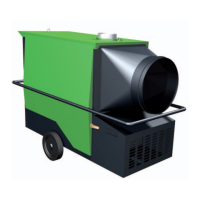13
Cleaning the heat exchanger
1. Set the operating switch to the
"0" position and remove the
power plug from the mains
socket.
2. Take off the exhaust hood 1
after removing the 4 fastening
screws. Hot air hoses present
need not necessarily be
removed.
3. Remove the inspection cover 2
and withdraw the exhaust gas
suppressors 4.
4.
Clean the flues 5.
A special cleaning brush is
available as an accessory with
EDP no. 1103110.
5. Clean the exhaust gas
suppressors or replace damaged
exhaust gas suppressors.
6. Check the seal 3 for the
inspection cover and replace
any damaged seals.
7. Following maintenance work,
refit all parts carefully in reverse
order.
Please also observe the
instructions on the next page.
Regular care and observation of
some basic requirements, once
yearly or after extended times at
a standstill, will ensure trouble-free
operation and a long service life of
the units.
■
Keep the units free of dust and
other deposits
■
Only clean the units with a dry
or moistened cloth
■
Never subject to direct jets of
water
e.g. pressure washers etc.
■
Never use abrasive or solvent-
based cleaners
■
Use only suitable cleaners, even
for heavy contamination
■
Use only clean EL heating oil or
diesel fuel
Beware of paraffin formation!
■
Check the fuel filter(s) for
contamination at regular
intervals. Replace contaminated
filter if necessary
■
Check the units for mechanical
damage and have defective
parts properly replaced
■
Check the fan blades and
combustion chamber with heat
exchanger for contamination at
regular intervals and clean these
if necessary
■
Check the on-site oil tank
regularly for contamination,
condensate water, foreign
bodies and clean if necessary
Care and maintenance
s
s
s
4 3 2
1
5
■
Check that the safety devices
are operating correctly at
regular intervals
■
Keep the probes for the safety
devices free of dust and dirt
■
Have the exhaust gas values for
the forced-air burners checked
by authorised specialists at
regular intervals.
For safety reasons we
recommend the conclusion of a
maintenance contract
■
Observe maintenance and care
intervals
■
In the event of defects that
endanger the operational safety
of the units, operation of the
units must be discontinued
immediately and the supervisor
informed!
Cleaning tasks
The units, including the heat
exchanger, combustion chamber
and forced-air burner must be
cleared of dust and dirt after
every heating period, or possibly
earlier depending on the operating
conditions.
Wearing parts, such as exhaust
gas suppressors, seals, oil filter
inserts and oil nozzles for example,
should be checked and replaced if
necessary.
NOTE
Adjustment and maintenance
work may only be carried out
by authorised and qualified
technicians.
CAUTION
Before undertaking any work
on the units, the power plug
must be removed from the
mains socket.
!

